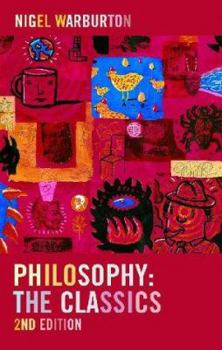Philosophy: The Classics
Select Format
Select Condition 
Book Overview
Now in its fourth edition, Philosophy: The Classics is a brisk and invigorating tour through the great books of western philosophy. In his exemplary clear style, Nigel Warburton introduces and... This description may be from another edition of this product.
Format:Paperback
Language:English
ISBN:0415239982
ISBN13:9780415239981
Release Date:April 2001
Publisher:Routledge
Length:272 Pages
Weight:0.65 lbs.
Dimensions:0.8" x 5.1" x 7.8"
Related Subjects
Education & Reference History & Surveys Philosophy Politics & Social Sciences ReferenceCustomer Reviews
5 ratings
Excellent survey of classical philosophy
Published by Thriftbooks.com User , 16 years ago
Philosophy is a hobby I enjoy greatly but it is hard to find book that covers a wide variety of philosophers and does it well. He covers twenty-four works from Plato's "The Republic" to Rawl's "A Theory of Justice" in 239 pages. For each work he provides background on each work, a summary and hits all the keys points and then rounds it off with some critical analysis and provides further reading advise. I found the coverage of each piece to be just right, you can read through the book relatively fast yet gleam enough to decide what you want to read more about. Plus you will feel confident that you have a grasp of the key ideas and can start thinking critically about them. You definitely will not be an expert but the passages will be illuminated enough for you to decide which ones you are interested in traveling down further.
Great introduction to a pretty complex field
Published by Thriftbooks.com User , 16 years ago
This is a good book for anyone who wants to understand or start to understand philosphy. Great start !
Excellent Introduction
Published by Thriftbooks.com User , 20 years ago
PTC is my first book which I seriously read about philosophy. This is an excellent introduction to this difficult subject which will never reach the daily life if there is no effort in its popularization made by someone like Mr Warburton. He is successful in highlighting the theme of each classic work of a wide range from Plato's Republic to Wittgenstein's Philosophical Investigation. He never fails to present the argument of each philosopher from different angles and focus on the crux. The book in itself provides a great reading but if you follow the list of further reading of each chapter recommended by Mr Warburton, you even can learn more about the philosophers concerned. Some of the books as recommended are even classics of their own.In passing, if you like to learn more about Mr Warburton's philosophy of the popularization of the subject, please do not miss an interview with him in another book New British Philosophy - The Interviews by the same publisher.
Simplicity without oversimplification
Published by Thriftbooks.com User , 22 years ago
Warburton is one of my favorite philosophers. I thoroughly enjoyed all his books. This author has the gift of breaking down complex ideas and explaining them in a highly intelligible fashion. But while Warburton does not assume that his reader has a substantial background on the subject, his writings are not superficial, nor is his style condescending. This book is a great read for virtually anyone with a genuine interest in philosophy.
Now a word from Phil O. Sopher
Published by Thriftbooks.com User , 23 years ago
This book is easy to read. I like books that are easy to read. Therefore, I like this book. PTC is an introduction to twenty great works in the history of philosophy. They are: Plato's Republic; Aristotle's Nichomachean Ethics; Descartes' Meditations; Hobbes' Leviathan; Locke's An Essay Concerning Human Understanding and Second Treatise of Government; Hume's An Enquiry Concerning Human Understanding and Dialogues Concerning Natural Religion; Rousseau's The Social Contract; Kant's Critique of Pure Reason and Groundwork of the Metaphysics of Morals; Schopenhauer's The World as Will and Idea; Mill's On Liberty and Utilitarianism; Kierkegaard's Either/Or; Marx and Engel's The German Ideology; Nietzche's On the Genealogy of Morality; Ayer's Language, Truth and Logic; Sartre's Being and Nothingness; Wittgenstein's Philosophical Investigations. The point of each chapter is simply to introduce each book and present the important ideas. Each chapter usually consists of ten to twelve pages, enough space to provide the pertinent details without overwhelming the reader (Warburton assumes that his readers will have had little or no previous experience reading or studying philosophy). He ends each chapter with common criticisms of each work presented, a glossary of terms, and a reading list for further study.




